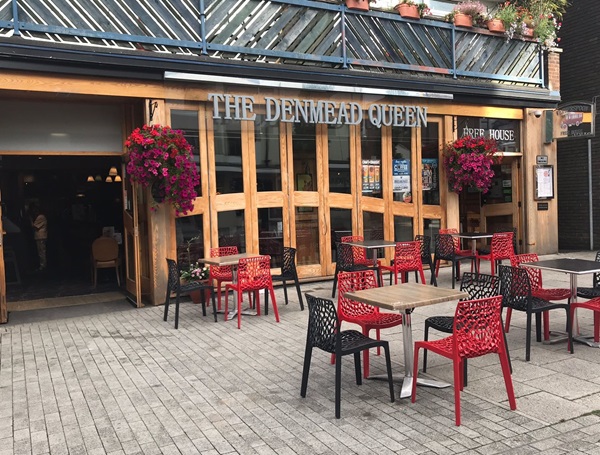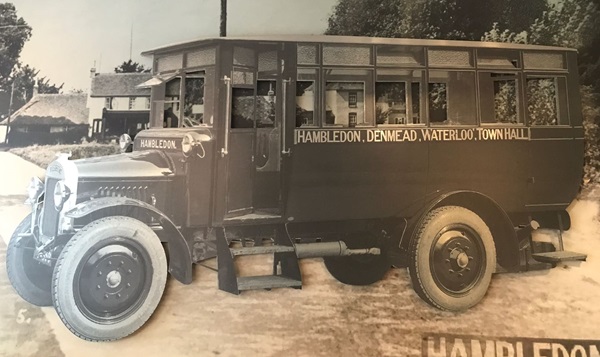Pub history
The Denmead Queen
The Wadham name entered Waterlooville’s history in 1871, when Charles Wadham established a draper’s on London Road. The family firm later became Wadham Brothers’ Motor Company and Waterlooville’s biggest employer, building open-topped double-deck buses for Portsmouth Corporation and Denmead Queen buses for FG Tanner of nearby Denmead village. Over the years, there were several models of the single-deck Denmead Queen buses, used until the mid 1930s.
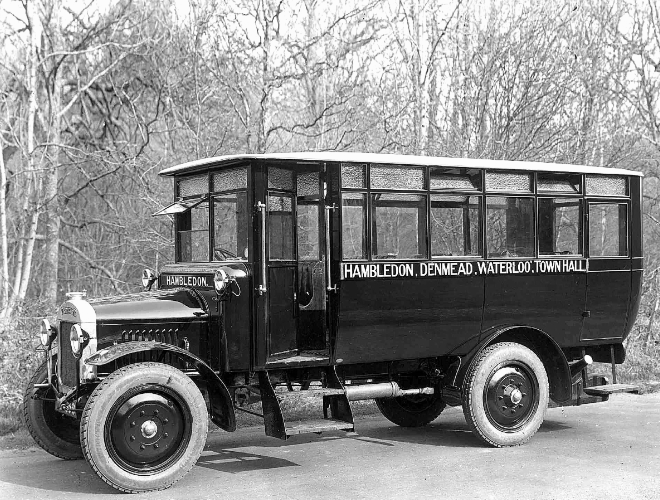
The Wadham name entered Waterlooville’s history in 1871, when Charles Wadham established a draper’s on London Road. The family firm later became Wadham Brothers’ Motor Company and Waterlooville’s biggest employer, building open-topped double-deck buses for Portsmouth Corporation and Denmead Queen buses for FG Tanner of nearby Denmead village. Over the years, there were several models of the single-deck Denmead Queen buses, used until the mid 1930s.
Photographs and text about the end of the tramway
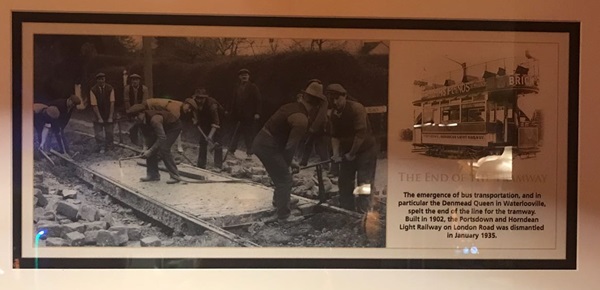
The text reads: The emergence of bus transportation, and in particular the Denmead Queen in Waterlooville, spelt the end of the line for the tramway. Built in 1902, the Portsdown and Horndean Light Railway on London Road was dismantled in January 1935.
Photographs and text about Charles James Napier
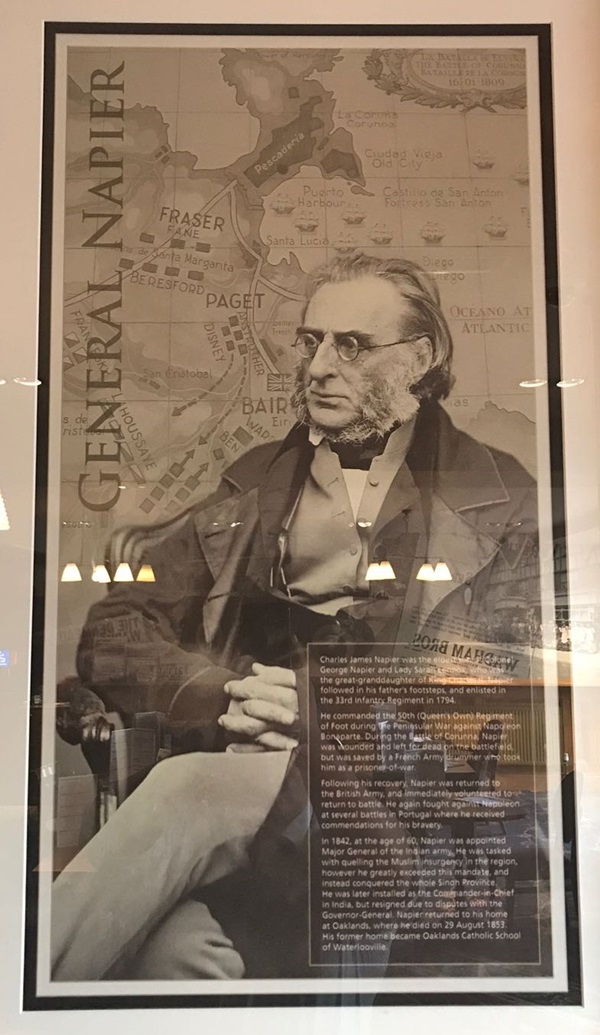
The text reads: Charles James Napier was the eldest son of Colonel George Napier and Lady Sarah Lennox, who was the great-granddaughter of King Charles II. Napier followed in his father’s footsteps and enlisted in the 33rd Infantry Regiment in 1794.
He commanded the 50th (Queen’s Own) Regiment of Foot during the Peninsular War against Napoleon Bonaparte. During the Battle of Corunna, Napier was wounded and left for dead on the battlefield but was saved by a French Army drummer who took him as a prisoner of war.
Following his recovery, Napier was returned to the British Army and immediately volunteered to return to battle. He again fought against Napoleon at several battles in Portugal, where he received commendations for his bravery.
In 1842, at the age of 60, Napier was appointed major general of the Indian army. He was tasked with quelling the Muslim insurgency in the region; however, he greatly exceeded this mandate and instead conquered the whole Sindh Province. He was later installed as the commander-in-chief in India but resigned due to disputes with the governor-general. Napier returned to his home at Oaklands, where he died on 29 August 1853. His former home became Oaklands Catholic School of Waterlooville.
Photographs and text about Charles Herbert Taylor Marshall
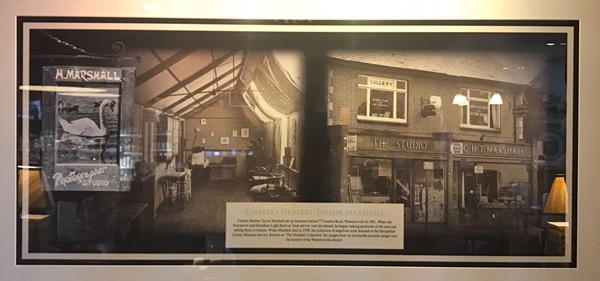
The text reads: Charles Herbert Taylor Marshall set up business behind 77 London Road, Waterlooville, in 1901. When the Portsdown and Horndean Light Railway tram service was introduced, he began making postcards of the area and selling them to tourists. When Marshall died in 1958, his collection of negatives was donated to the Hampshire County Museum Service. Known as The Marshall Collection, the images form an invaluable pictorial insight into the history of the Waterlooville district.
A photograph and text about the men who built Waterlooville
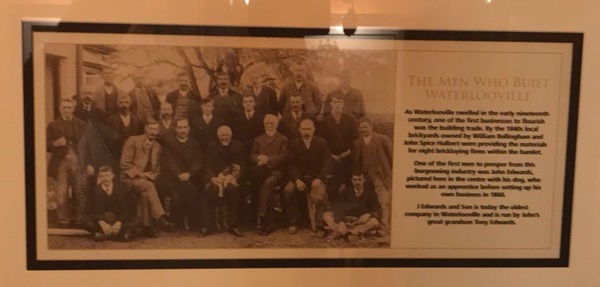
The text reads: As Waterlooville swelled in the early 19th century, one of the first businesses to flourish was the building trade. By the 1840s, local brickyards owned by William Bellingham and John Spice Hulbert were providing the materials for eight bricklaying firms within the hamlet.
One of the first men to prosper from this burgeoning industry was John Edwards, pictured here in the centre with his dog, who worked as an apprentice before setting up his own business in 1860.
J Edwards and Son is today the oldest company in Waterlooville and is run by John’s great-grandson Tony Edwards.
An illustration and text about the origins of Waterlooville
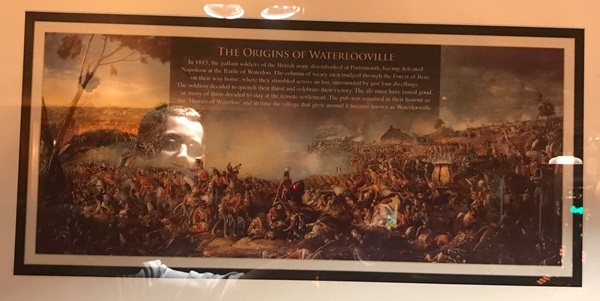
The text reads: In 1815, the gallant soldiers of the British Army disembarked at Portsmouth, having defeated Napoleon at the Battle of Waterloo. The column of weary men trudged through the Forest of Bere on their way home, where they stumbled across an inn, surrounded by just four dwellings. The soldiers decided to quench their thirst and celebrate their victory. The ale must have tasted good, as many of them decided to stay at the remote settlement. The pub was renamed in their honour as the Heroes of Waterloo, and in time the village that grew around it became known as Waterlooville.
An old photograph of a local bus heading to Waterlooville Town Hall
A photograph and text about Restall’s Denmead Stores
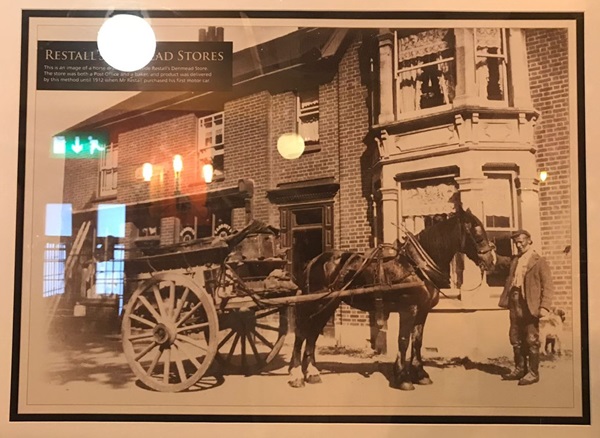
The text reads: This is an image of a horse-drawn cart outside Restall’s Denmead Store. The store was both a post office and a baker’s, and products were delivered by this method until 1912, when Mr Restall purchased his first motor car.
Original hand-crafted bicycle by sculptor Martin Lister
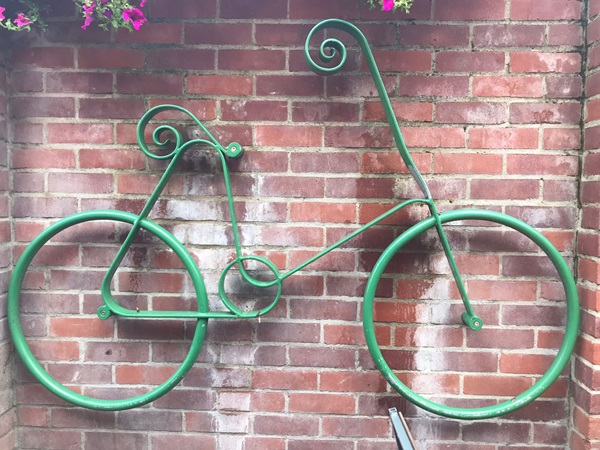
Commissioned by J D Wetherspoon for the Denmead Queen
Harold Wadham of Waterlooville started making bicycles in 1900, before his brother joined him. The Wadham brothers went on to begin making coaches in 1904. Look inside the pub to read about the history of the Wadham brothers and their contribution to the town.
The wall-mounted bicycles in the beer garden are a small reminder of this town’s rich history.
External photograph of the building – main entrance
